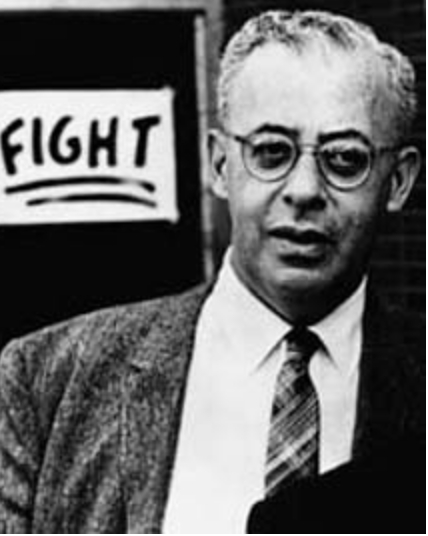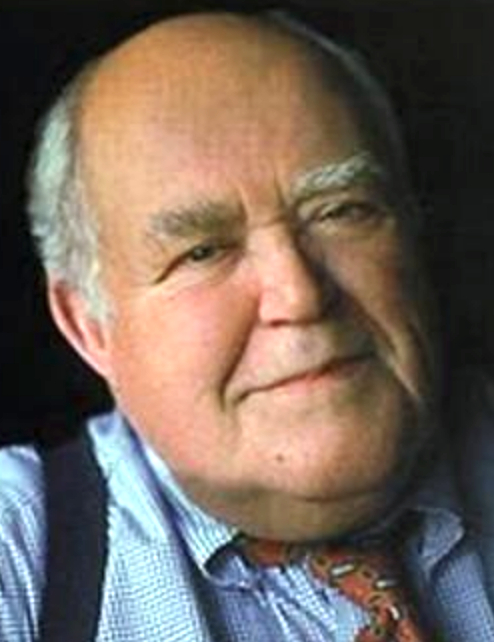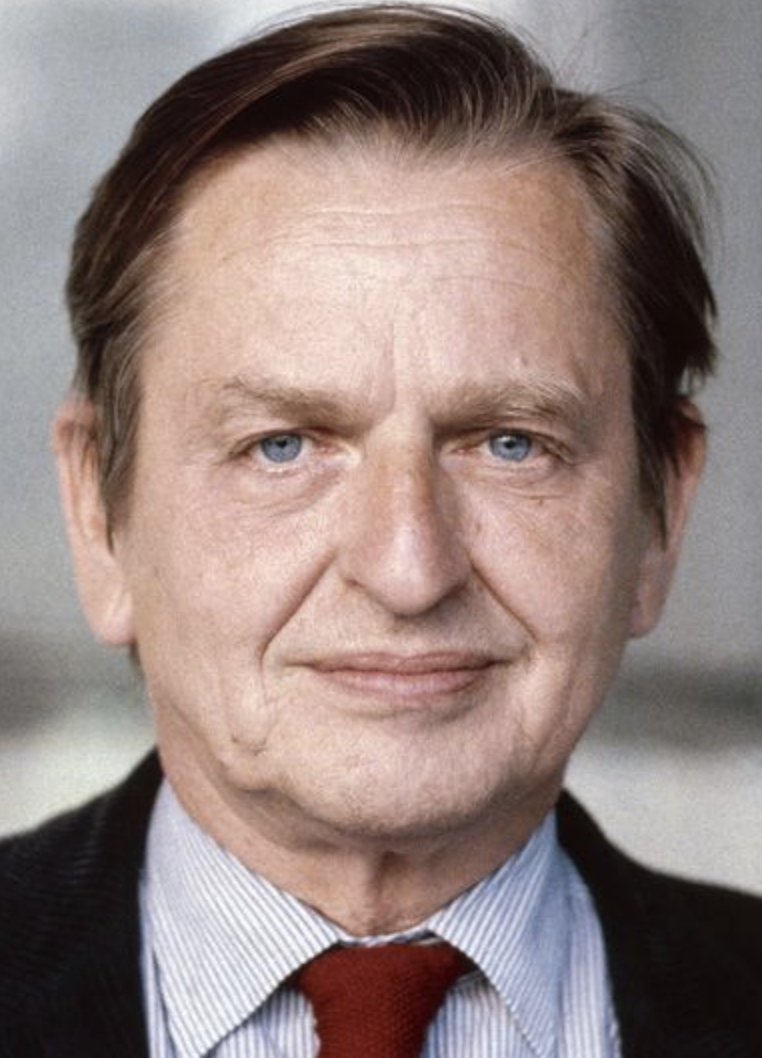January 30
Saul Alinsky

On this date in 1909, community organizer Saul David Alinsky was born in a Chicago slum to Russian-Jewish immigrant parents. Alinsky said in an interview that they “were strict Orthodox; their whole life revolved around work and synagogue.” When asked if he was devout as a boy, he responded, “I suppose I was — until I was about 12. I was brainwashed, really hooked. But then I got afraid my folks were going to try to turn me into a rabbi, so I went through some pretty rapid withdrawal symptoms and kicked the habit.” (Playboy, 1972)
Alinsky majored in archaeology at the University of Chicago, but after two years of graduate study he left to work as a criminologist for the state of Illinois. In the mid-1930s, he started working with the Congress of Industrial Organizations (CIO) and became a close friend of John L. Lewis. Alinsky shifted from labor to community organizing in 1939, focusing first on improving the impoverished slums he grew up in. In 1940, millionaire Marshall Field III provided him with funds to start the Industrial Areas Foundation (IAF), which grew into a prominent training institute for radical community organizers across the country.
Dolores Huerta and Cesar Chavez were connected to the IAF, along with numerous other organizers and movements. Alinsky’s “street-smart tactics influenced generations of community organizers,” including President Barack Obama and Hillary Clinton, who wrote her senior honors thesis at Wellesley College on Alinsky (New York Times, Aug. 22, 2009). The Times said Alinsky was “hated and feared in high places from coast to coast” for being “a major force in the revolution of powerless people.”
His political philosophy was very nonconformist, and this carried over into his personal life. When asked if he had ever considered joining the Communist Party, he told Playboy, “Not at any time. I’ve never joined any organization — not even ones I’ve organized myself. I prize my own independence too much. And philosophically I could never accept any rigid dogma or ideology, whether it’s Christianity or Marxism.” The goal of the radical, Alinsky explained in his last book, Rules for Radicals (1971), must be to bring about “the destruction of the roots of all fears, frustrations, and insecurity of man, whether they be material or spiritual.” Enemies of the poor “can no more live up to their own rules than the Christian church can live up to Christianity.”
In a move that horrified the Religious Right, Alinsky dedicated the book to the devil: “the first radical known to man who rebelled against the establishment and did it so effectively that he at least won his own kingdom — Lucifer.” His first book, published in 1946, was Reveille for Radicals. Three years later he published John L. Lewis: An Unauthorized Biography.
Alinsky married Helene Simon, another University of Chicago student, and they adopted two children, Kathryn and Lee David. Helen tragically drowned in 1947. He was married to Jean Graham from 1952 until their divorce in 1970. The next year he married Irene McInnis. He died of a heart attack in 1972 at age 63 while walking in Carmel, Calif. His ashes were buried in a family plot in Chicago. On the marker is a quote from Thomas Paine that also appears in the epigraph of Rules for Radicals: “Let them call me rebel and welcome, I feel no concern from it; but I should suffer the misery of devils, were I to make a whore of my soul.” (D. 1972)
PHOTO: Alinsky in 1963; photo by Pierre869856, CC 4.0.
“If you think you’ve got an inside track to absolute truth, you become doctrinaire, humorless and intellectually constipated. The greatest crimes in history have been perpetrated by such religious and political and racial fanatics.”
— Alinsky, 1972 interview with Playboy magazine
Jack Germond

On this date in 1928, journalist John Worthen “Jack” Germond was born in Newton, Mass. Germond wrote several books, mainly focusing on politics. After serving in the U.S. Army in 1946-47, he earned a B.A. and B.S. from the University of Missouri. He graduated in 1951 and began writing for the Rochester, N.Y., Times-Union, eventually heading its Washington bureau. He was the Washington Star’s political editor from 1974-81 and wrote a syndicated column on national politics for 24 years with fellow journalist Jules Witcover.
He moved to the Baltimore Sun when the Star folded. He first appeared on NBC’s “Meet the Press” in 1972 and “The Today Show” in 1980 and on PBS’ “The McLaughlin Group” in 1981. Germond tended to be liberal politically and was seen by many as in touch with the average American and as a traditional “old-school” newspaper reporter.
His books included Fat Man Fed Up: How American Politics Went Bad (2005), Fat Man in the Middle Seat: Forty Years of Covering Politics (2002), Mad as Hell: Revolt at the Ballot Box, 1992 (1994), Whose Broad Stripes and Bright Stars? (1989) and Blue Smoke and Mirrors: How Reagan Won and Why Carter Lost the Election of 1980 (1981). He co-wrote his earlier books with Witcover. He had two daughters with his first wife, Barbara Wipple. Their daughter Mandy died at age 14 from leukemia. After a 1988 divorce he married Alice Travis, a Democratic Party official and political activist. (D. 2013)
“In the interests of full disclosure, I must note that although I was brought up as a Protestant, I have been an atheist my entire adult life. I do not proselytize, however. Nor do I question the faith of others. I just don’t want to be obliged to accept someone else’s faith as a factor in my government. If John Ashcroft wants to hold a prayer meeting and advertise his piety, let him find someplace besides the Justice Department.”
— Jack Germond, "Fat Man Fed Up" (2005)
Olof Palme

On this date in 1927, Swedish statesman Sven Olof Joachim Palme was born into an upper-class, conservative Lutheran family in Stockholm. His businessman father, Gunnar Palme, died when he was 6, and Olof’s early education came from private tutors as he was a sickly child. After compulsory military service in an artillery regiment, he enrolled at the University of Stockholm, later transferring to Kenyon College, in Gambier, Ohio, a school of fewer than 2,000 students affiliated with the Episcopal Church.
He wanted to go to school in the U.S. and applied for scholarships through the American Scandinavian Foundation. His grandfather, a Lutheran bishop, insisted it be a Protestant college. “Suddenly I received a letter from Kenyon,” he told the Alumni Bulletin in 1984. “I had never heard of the college, but as it turned out I was lucky, extremely lucky to land there.” There he met a lifelong friend, actor Paul Newman. Fluent in English, French and German, he graduated in a year using credits earned in Stockholm.
He joined the Swedish Social Democratic Party during law school and worked for socialist Prime Minister Tage Erlander before being elected to the parliament in 1957. He had married Lisbeth Beck-Friis, a child psychologist, in 1956. They would have three sons, Joakim, Mårten and Mattias. Palme was named Erlander’s minister of education in 1967 and succeeded him in 1969 at a time when Sweden was strongly critical of U.S. involvement in Vietnam and offered asylum to American military conscientious objectors and deserters. The Social Democrats lost power in 1976 but regained it in 1982, returning Palme to head of state, where he remained until his assassination at age 59 on Feb. 28, 1986.
Christer Pettersson, who had a long record of petty crimes and substance abuse, was convicted of shooting Palme in the back with a .357 handgun while he and Lisbeth were walking home with no bodyguard from a movie. An appeals court soon overturned the conviction for lack of evidence, and the murder weapon was never found.
After a secular service attended by over 150 world leaders at Stockholm City Hall, he was buried in a private ceremony in the cemetery at Adolf Fredrik Church, where René Descartes was first buried in 1650 before his remains were moved to France. While Palme didn’t publicly air his views about religion, he didn’t attend church and was widely believed to be an atheist.
His time in office was marked by an expansion of the social safety net and support for human and women’s rights and education. He strongly opposed war and apartheid. “Olof Palme, party chairman and prime minister. Sweden’s Social Democratic Workers Party raised the stone” is engraved on a boulder at the head of his grave. (D. 1986)
“The American politicians have a ridiculous moral argument. They teach children and the public to believe in God because in their opinion the existence of God is necessary to assure justice in their own country and in the world. Their fear issues and beliefs in a defined Hell are the other half of the argument. Why should you and I, good respectable Scandinavian human beings, be punished in a Hell?”
— Palme, quoted in "My America: The Culture of Giving" by Jens Moe (2007)
Peter Singer (Quote)
"Paul Krugman says Democrats need to make it clear they value faith. Is everyone caving in to this religious nonsense? What is faith but believing in something without any evidence? Why should Democrats value that? Formidable as the task may seem at present, the long-term need is to persuade Americans that having evidence for your beliefs is a good idea."
— Peter Singer, Princeton professor of ethics, letter to the editor, The New York Times (Nov. 8, 2004)
